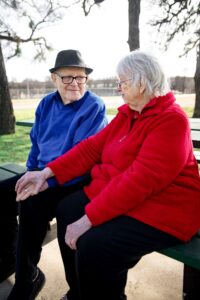 Successful aging in America requires planning and effort to gain or maintain a healthy lifestyle. It also means preparing for the future, financially and with end-of-life care. You will also want to ensure that you have made a will and instructions for what you want to be done after you pass.
Successful aging in America requires planning and effort to gain or maintain a healthy lifestyle. It also means preparing for the future, financially and with end-of-life care. You will also want to ensure that you have made a will and instructions for what you want to be done after you pass.
Aging in America is more than living beyond retirement age. It is a lifestyle of embracing a new season of life and enjoying what it brings you. But you need to prepare ahead of time as there are more older generations in the population than younger generations.
Is aging in America an issue?
Aging in America is quickly becoming an issue as the Baby Boomer generation ages and requires more care, such as healthcare, assisted living, nursing, and hospice. Closely following the Boomers is Generation X, those children born between 1965 and 1981. Generation X is entering a season of their lives that requires annual screenings and lifestyle changes to prepare for the next fifty years. These generations are also living longer than previous generations.
The younger generations are choosing to have fewer children, delay having children, or deciding not to have any children at all. This means that by the time that generation is ready for retirement, the country may not have enough healthcare workers.
This is another reason we must make plans and lifestyle changes before our health demands it.
What we can do.
There are several steps you can take to prepare for a new chapter in your life.
Become financially aware.
Do you know how you will fund your lifestyle after retirement? Will you rely solely on Social Security? Do you have a retirement plan, rental property, or investments? Now is the time to think about how you will live through your 60s, 70s, 80s, 90s, or beyond. One person out of 5,000 lives to be100. Prepare accordingly.
Know your medications.
You may not be able to pronounce the names of every medication that you take. But you can keep a list of medication names, instructions, and what condition they treat. These lists come in handy in an emergency. Also, include any medication, food, material, or other allergies.
names, instructions, and what condition they treat. These lists come in handy in an emergency. Also, include any medication, food, material, or other allergies.
Prioritize vision and hearing.
As we age, our vision and hearing can progressively worsen. To ensure a better quality of life, keep all annual eye and hearing appointments. Both industries have made tremendous advances over the years from laser surgery to barely-there hearing devices.
Rest when you need it.
When we were younger, we hustled through life, paying the bills, building careers, and taking care of responsibilities. Learn how to rest when you need to for your physical and mental health. You will still get things done, but you must learn how to prioritize your care.
Prepare end-of-life care and funeral arrangements.
No one likes to think about dying, but successfully aging in America means acknowledging that we only live one life, we need to care for our body which is a temple for the Holy Spirit, and make appropriate arrangements, if possible, to lessen any burden on our family and friends. An elder-law specialist can help you draw up legal documents about your end-of-life care, will, and funeral arrangements.
How to age smoothly.
Little tweaks in your lifestyle habits can prevent or delay certain conditions. For example, when you eat nutritious meals and avoid processed foods and sugar-laden treats and drinks, you might avoid developing Type II diabetes and obesity. Both conditions can shorten your lifespan.
If making too many changes at once seems overwhelming, take it slow. Choose one habit and incorporate it for thirty days before moving on to the next. This baby-step approach will ensure that your new habit becomes routine.
 Eat at home most of the time.
Eat at home most of the time.
It may not be necessary to eat at home all the time if you know what foods the most nutritious choices are. A nutritionist can help you make menus with healthier fare for cooking at home. When you eat at home, you control the ingredients and preparation.
You know exactly what is on your plate. However, restaurants can add extra ingredients for added flavor that could raise your cholesterol and sodium levels. Choose meals that are quick and easy to make for the first month.
Lift weights.
As we age, we lose muscle mass. This process, known as sarcopenia, starts at a relatively early age, typically in the 30s or 40s. Lifting weights can help to maintain or rebuild muscle which is essential for strength, balance, flexibility, and energy expenditure.
If you have never lifted weights before or it has been a long time, consult a personal trainer about proper form and weight. Always consult with your physician before engaging in any new exercise.
Watch your blood pressure.
High blood pressure does not typically give off any noticeable physical symptoms, however, prolonged high blood pressure can lead to heart disease and conditions like peripheral artery disease, a condition that can narrow the arteries, making walking difficult. Monitor your blood pressure at home regularly. Healthy blood pressure is less than 120/80; however, your physician may have a specific range for you.
Use SPF while outdoors.
Sunscreen products protect your skin from the sun’s harmful rays. UVA rays contribute to the early signs of aging while UVB rays can lead to sunburn. Unprotected skin can lead to lesions and cancer. Choose a product with an SPF of 30 or higher and apply generously. If you plan to be outdoors for a prolonged time, reapply every two hours.
Learn how to de-stress.
Chronic stress causes the body to release the stress hormone cortisol. Too much cortisol can lead to chronic inflammation, high blood pressure, high blood sugar, anxiety, depression, and rapid weight gain.
The best way to combat the effects of cortisol is to practice managing your stress. Exercise and breathing techniques are both effective methods for lowering stress levels. Since stress is often the result of fear or worries about something from the past or future, you can also practice the 5-4-3-2-1 method.
When you feel stressed or at the start of a panic attack, name 5 things you can see, 4 things you can touch, 3 things you can hear, 2 things you can smell, and 1 thing you can taste. This method helps to ground you and bring you back to the present.
Maintain a healthy waist circumference and weight.
Many experts rely on body shape and the Body Mass Index (BMI) to determine if someone is at a higher risk for heart disease and other conditions. BMI is based on your weight and height. A higher number could indicate a higher risk for heart disease, Type II diabetes, and high blood pressure.
Physicians also consider body shape; a rounder body (like in the shape of an apple) could also indicate these conditions. If your waist is greater than 35 inches for a woman or greater than 40 inches for a man, consult with your physician about how to lose weight safely.
Be aware of high-risk conditions.
Keep in mind conditions that you may have a higher risk of developing, For example, if you have a family history of heart disease, your physician should keep a close eye on your blood pressure, heart rate, and fitness level. Family history, genetics, environment, and habits can contribute to specific conditions. Ask your physician how you can reduce your risk with lifestyle changes or medication.
Are you looking for an aging and geriatric professional?
Successful aging in America is more than just your physical health; to age successfully you need to take the emotional, mental, and spiritual aspects of your health into consideration. We can help. Contact our office today to schedule an appointment with an aging and geriatric counselor at Stone Oak Christian Counseling in San Antonio, Texas.
“Smiling Man”, Courtesy of Tim Mossholder, Unsplash.com, Unsplash+ License; “Two Men Walking”, Courtesy of John Moeses Bauan, Unsplash.com, CC0 License; “Still in Love”, Courtesy of Tim Mossholder, Unsplash.com, Unsplash+ License; “Smiling Woman”, Courtesy of Tatiana Zanon, Unsplash.com, CC0 License
-
Melissa Plantz: Author
Melissa Plantz is a Christian author and freelance writer. She spent twenty years in the pharmacy industry and has specialized in faith, fitness, nutrition, geriatrics, and mental health since 2015. She writes from the beautiful Lake Marion area in S...
DISCLAIMER: THIS ARTICLE DOES NOT PROVIDE MEDICAL ADVICE
Articles are intended for informational purposes only and do not constitute medical advice; the content is not intended to be a substitute for professional medical advice, diagnosis, or treatment. All opinions expressed by authors and quoted sources are their own and do not necessarily reflect the opinions of the editors, publishers or editorial boards of Stone Oak Christian Counseling. This website does not recommend or endorse any specific tests, physicians, products, procedures, opinions, or other information that may be mentioned on the Site. Reliance on any information provided by this website is solely at your own risk.




